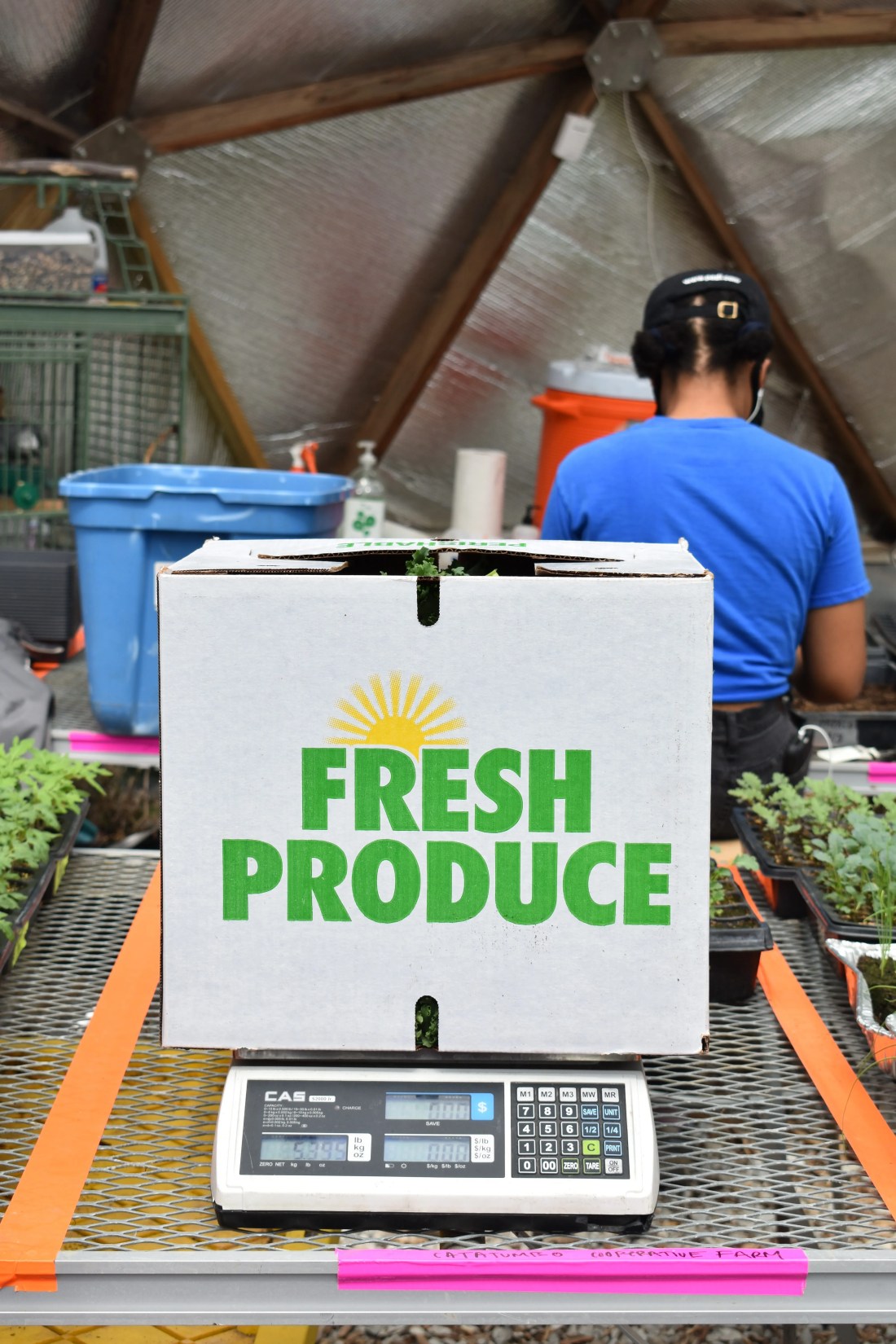In years past, the consensus might’ve been that farming was an activity reserved for those with acres of land to spare, dressed in overalls with wheatgrass hanging from the side of their mouth. A way of life inhabited by relatives and ancestors who never migrated North or had it passed down within their families.
In recent years, farming has made its way into larger cities where, although grass and soil may be limited, the enthusiasm to see BIPOC communities engaging with their environment and reaping the benefits of sowing and tending to the land is motivation enough—at least for the folks at Urban Growers Collective (UGC), a non-profit organization created out of the need to feed, cultivate and enrich their community with the skill of urban farming.

Co-founded by Erika Allen and Laurell Sims back in 2018, the UGC is a community-based food movement that grows and distributes fresh vegetables amongst Chicago’s South Side residents. Operating on eight farms and roughly 11 acres of land, UGC is not only a fully operational farm but an educational site that houses workshops, as well as opportunities for employment. Just ask Malcolm Evans, director of farms for UGC, whose been with Erika since he was nine years old and takes immense pride in his work,
“I’m in my 20-year point now. … I’m a Black farmer and I grew up in Cabrini Green. [I’m] real serious about my work and understand how important this work that we’re doing as a collective is [to] our community,” Malcolm told THE BLOCK.
Utilizing intense growing methods to produce year-round, the UGC is starting a serious conversation about the promise that urban farming holds.
“I think the takeaway is that we really love training, love sharing information on our teams and problem-solving, and being present in our work with the community. We’re really serious about distributing the food that we grow to the communities that we work in, kind of re-enchanting our community around working in the earth and seeing that as an important part of our humanity,” said co-founder, visual artist, and urban farmer Erika Allen.
“And then, healing from structural racism, which really took us away from our land … through terror, through economic manipulation, and how it’s impacted our understanding of our relation to the environment.”
UGC advocates for residents to take control of what they eat and where they source food from. As a community-focused non-profit, their work uplifts the BIPOC communities and prioritizes Black health through initiatives that directly impact the community, such as the Fresh Moves Mobile Market.

“The program has blossomed tremendously, from start to now,” Fresh Moves Logistics Coordinator Joshua Hughes said. “Even in the time before me, we were serving hundreds of customers a week. … The demand is always going to be there. It’s always going to increase in Chicago.”
The Fresh Mobile Market provides a clean, fresh means of eating for South Side residents acting as a mobile grocery store—a great way for residents to shop fresh without having to leave their neighborhood. With dedicated farmers and food workers fulfilling the need for a fresh market and acting, for many, as the only reliable source of fresh food in the area, UGC engages the community around learning about farming.
Before the Great Migration, many Black families worked and tended farms as their way of life. Now a skill almost lost, UGC is helping those reclaim the lifestyle of gardening and farming in hopes that it will be an asset that encourages sustainability for years to come.
“Beginning of the 2000s, there’s very few people doing this work. Older people did because there was a resurgence in the late 60s, 70s that people went back to the land. But to have that be at this point again, where there’s so many young people valuing and thinking about it [and] changing their understanding of what’s valuable, is super exciting,” Erika said.


Lasting legacy isn’t created overnight, as Malcolm shared, it is established first with care, then carefully tended and nourished. UGC is a Black and women-led organization that utilizes its folks within the margins to better inform how the organization can support the community.
“I feel like [the community] loves it,” Malcolm said about UGC’s presence in the neighborhood. “And they need it. [But] it’s not no overnight thing. And I feel like your community, they go off your work, so they got to trust you. When you build a trust in your community, your community will support and appreciate the work that you do,” he continued.
“I think it’s important for folks in the community to see us doing the work that we do in care of the community. That alone is healing,” Erika added.
Care is an essential part of what keeps the crops watered and the lights on over at UGC. The team shared that, through their work, they’ve managed to establish trust with customers and even build relationships with other business that could benefit from their harvest.
“There’s definitely that emotional connection built between us and the customers, which has been really great. Not only do we have produce that we provide, but we also partner with a lot of Black-owned businesses here in the Southside of Chicago. It further builds that ecosystem of Black ownership that I think people need to see,” Joshua explained.
This ecosystem feeds into UGC’s hopes of a Black Wall Street for Southside Chicago, one that can only flourish with mutual collaboration and positive outlook on the future of farming.
It’s been amazing doing this kind of work here. The impact is very visible, very real. it’s just nice to continue to build the ecosystem of sustainability for creativity and food access and nourishment for black and brown communities here in Chicago and in the Midwest.
Joshua Hughes
Led by BIPOCs, womxn and LGBTQIA folks, the collective gives urban farming a face that many could identify with, hopefully helping to further open the doors and break down barriers in the farming industry.
“I think for our farming production and of our operations, that we can grow this food and know that it’s going to folks that we want to be eating the food is super inspiring for us as a team, to be able to own that whole supply chain. And then to have, because of that, the ability to then build on that and to expand it,” Erika said.
Through innovative work, community organizing and stewardship, the UGC is proving that urban farming is a sustainable lifestyle worth considering.
To learn more about Erika, Joshua, Malcolm and the rest of the UGC team, head over to their website and follow them on Facebook, Twitter, and Instagram to stay updated on all things Urban Growers.




